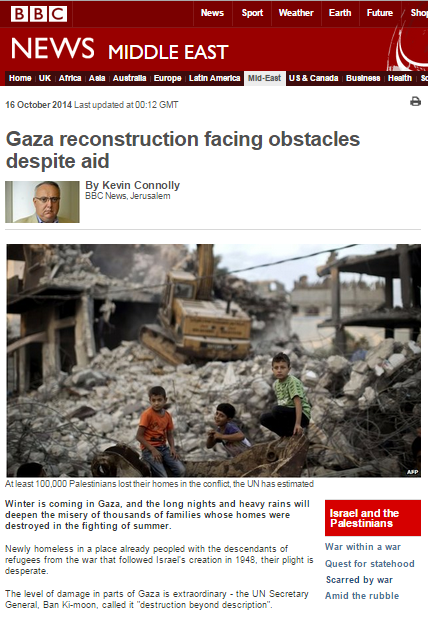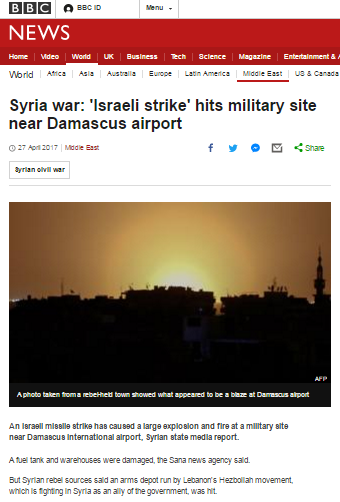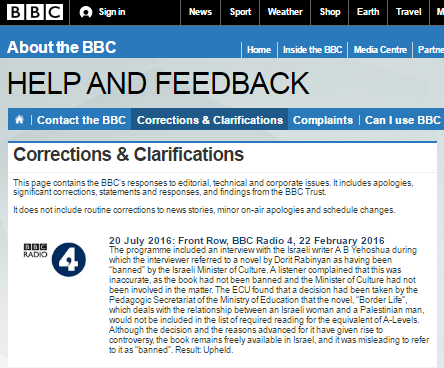h/t RB
An edition of the BBC World Service radio news and current affairs programme ‘Weekend‘ that was broadcast on September 3rd included an item promoting some noteworthy framing of the Gaza Strip but before that, presenter Paul Henley introduced his studio guests (from 26:30) Stewart Purvis – formerly of ITV and OFCOM – and Jane Kinninmont of Chatham House.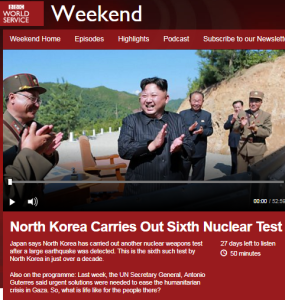
Leading up to the Gaza related item, listeners heard some interesting signposting (from 28:09) concerning radicalisation and terrorism which dovetails perfectly with the BBC’s chosen narrative on those topics.
Henley asked Kinninmont: [all emphasis in italics in the original, emphasis in bold added]
Henley: “How much…when you’re looking at causes of instability and the endless problems that you concentrate on there [the Middle East], how much do you put down to unemployment, which seems to be the big social and economic problem?”
Kinninmont: “Absolutely. We need to look at the political economy of the region and the sense of injustice that’s created for many young people because they see corrupt people succeeding and they see so little opportunity for themselves even if they are hard-working, even if they are highly educated. These are probably more important things to look at than the ideology that the media obsesses over when thinking about terrorism; not least because you can actually address some of these economic problems.”
Henley: “And because of the interest in terrorism and…and where it comes about, do you have particular countries that you’re more interested in?”
Kinninmont: “Well we cover the whole region and we try very much in our team of analysts to speak about the 99% of people from the Middle East who have nothing to do with terrorist groups. Ah…I fear that the oxygen of publicity is still an issue; that there is a kind of media obsession with terrorism over and above all other problems.”
Following that (at 29:22) Henley turned listeners’ attentions to the topic of the UN Secretary General’s recent visit to Israel, the Gaza Strip and the PA controlled territories: a topic previously very briefly covered by BBC News in one report. While referencing Israeli and Egyptian counter-terrorism measures, Henley did not bother to inform listeners why they are necessary.
Henley: “Last week the UN Secretary General Antonio Guterres visited Israel and the Gaza Strip for the first time since he took office. Speaking at a UN run school, Mr Guterres said urgent solutions were needed to the humanitarian crisis in Gaza. A recent UN report says living conditions for the two million people who live in Gaza – which is blockaded by both Israel and Egypt – are deteriorating rapidly. Mr Guterres stressed that resolving the crisis also required political will and he called on the Palestinians to end the division between Hamas – which rules Gaza – and Fatah – which governs the West Bank. In a speech in Tel Aviv he said he’d never shied away from criticising all sides in the conflict if he felt their actions weren’t moving towards a peaceful solution.”
Guterres’ remarks at a UNRWA school in Gaza also included “an appeal for unity” between the Palestinian factions engaged in a decade-long dispute along with a call to “avoid the buildup of the militantism” that is the cause of the blockade on the Gaza Strip. Significantly – given the later framing in this item – listeners were not told of those remarks.
The “recent UN report” to which Henley referred was previously presented to BBC World Service listeners in a problematic report that failed to clarify the real reasons for the humanitarian crisis in the Gaza Strip.
Guterres’ “speech in Tel Aviv” was delivered at the Museum of the Jewish People and listeners then heard the small part of it that the BBC chose to highlight – but without being informed of the crucial fact that Hamas rejects the two state solution.
Recording Guterres: “It’s my deep belief that the two state solution is the only way forward; the only path towards the historic compromise that can settle this conflict and lead to a better future for all. That is why I have been – and will continue to be – expressing my disagreement when it’s the case with unilateral measures and facts on the ground that can or could undermine that solution, including settlement activities but also continued violence, terror and incitement.”
At 30:40 Henley gave a brief introduction to a guest who was allotted almost half the air-time of the entire item. Her unchallenged claims were also separately promoted by the BBC World Service in a related programme.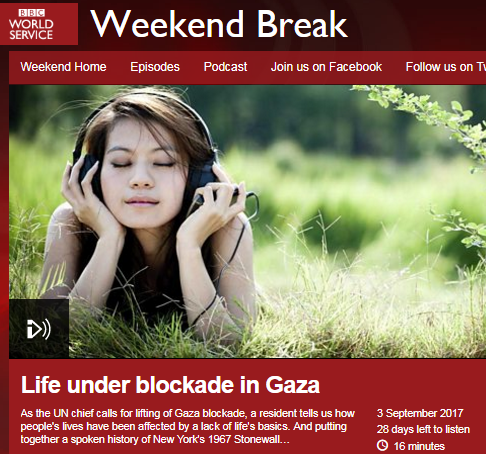
Henley: “So away from the talk of the so-called important people, what is life like for the people of Gaza? Najla is a mother of two children. She was born in Gaza and she’s lived there all her life.”
In breach of BBC editorial guidelines on impartiality, that first name only introduction clearly does not allow listeners to understand who the speaker actually is or what her affiliations and “particular viewpoint” are.
Najla Shawa appeared on the BBC World Service over two years ago and then too the introduction was inadequate with the fact that she works for the politically partisan NGO Oxfam and was previously employed in various roles by the UN left unclarified. With Shawa having studied for three years at Birzeit University near Ramallah and subsequently at George Mason University in the US, Henley’s claim that she has “lived in Gaza all her life” is obviously misleading.
Shawa began with the promotion of the ‘Gaza prison’ theme. On the last working day before this item was aired, 638 people had entered or exited the Gaza Strip, seven ambulance crossings had been facilitated and 18,157 tons of goods in 577 trucks had entered the territory on one day alone.
Shawa: “The entire population is simply living in a big prison. We are unable to move, there’s no way to travel so the restriction of movement is on everything; on people and on goods – at least from Gaza to the outside world. Gaza has some input such as food and basic items but there’s no way for any economic activity to take place.”
In fact, in June 2017, 1,304 tons of goods were exported from the Gaza Strip. Shawa continued with a presentation of the electricity crisis in the Gaza Strip which did not clarify to listeners that it is the product of the internal dispute between Fatah and Hamas and is completely unconnected to the previously mentioned “blockade”.
Shawa: “People are continually living uncertainty and challenged by different issues every day. The last few months there was the electricity situation that worsened and has really deepened the humanitarian situation in Gaza and affected everyone, and particularly affects people who have less financial ability or less ability to access things like food or basic items. You know, in Gaza unemployment is at really alarming rate: some 60% among people who are able to work; in a working age. Poverty is also at very high rates. “
Shawa appears to be passing off rounded-up youth unemployment figures as general unemployment rates: according to the World Bank, the general unemployment rate in the Gaza Strip in 2016 was 42%, with youth unemployment at 58%. The Palestinian Central Bureau of Statistics has slightly different figures and notes the very low workforce participation rate among females over the age of 15. The CIA World Factbook cites a poverty rate of 30%. Shawa continued:
Shawa: “Again, electricity; this is something that we’ve been living with for many years – I would say at least 10 years. But the last few months we are getting only 3 to 4 hours of electricity every day. You can imagine people’s refrigerators are turning into closets. We joke about it but there’s no way to keep things in your fridge. And you can imagine what this means to poor people who can’t afford simply to buy things every day. We adapt to schedules; we are going to have electricity from this hour to this hour so yeah we plan for laundry, we plan to maybe go out and do whatever. I mean, you know, you simply want to get out of the house.
You can also look at like small producers, small enterprises; they have shut down. Even big, larger ones are affected; they’re having to endure large amount of money just to survive, just to keep their business going and keep their work going. If we talk about water, water is the major, major threat problem in Gaza since many years. The way we get water, you need electricity for water to be pumped. You need water to be in a good quality. We have very salty water. There’s very little infrastructure. There is very little room for even doing any solutions for water. The majority of the sea is polluted with sewage. I mean real sewage – like raw sewage – and this is another huge problem. It’s causing a real environmental problem. We simply cannot eat the fish that is from the sea because it’s only full of sewage. We’re in the summer season and the heat and humidity in Gaza is very high and living under these conditions, children – I’m thinking about health – the simple, simple daily activity of people is extremely challenging.”
Yet again, no effort was made to clarify to listeners that the issues concerning sewage and water are rooted in the internal dispute between Hamas and Fatah and the all-important issue of Hamas’ prioritisation of replenishing and expanding its military infrastructure over civilian needs was not brought to audience attention.
Henley then inserted linkage to his previous conversation with Jane Kinninmont concerning ‘reasons’ for radicalisation.
Henley: “And I know you consider yourself relatively privileged but there are an awful lot of poor people judging by the rate of unemployment.”
Shawa: “That’s correct. I mean you’re talking about 80% of the Gaza Strip depends on aid. The Palestinian internal divide is also causing an additional layer to these problems that the Gazans are facing.”
No attempt was made to explain to listeners what that passing reference to “the Palestinian internal divide” actually means or how it affects Gaza residents.
Henley: “And when the UN Secretary General Antonio Guterres comes to Gaza and calls for an end to the blockade, is he seen as an ally by people there? I mean the demonstrators were greeting him angrily.”
Henley did not clarify that the demonstrations were in support of convicted terrorists serving time in Israeli prisons.
Shawa: “Of course. I mean people here appreciate the role of the UN because it is providing basic services to the majority of the population of Gaza. I mean we know that people considers as their right because the majority of the Gazans are refugees and the services are provided by UNRWA in addition to other agencies. However, there is a great deal of anger because the UN is simply not doing much on the political level of things and this is purely a political issue and everybody knows that. Expressing concern and calling for an end of blockade is not enough and we’ve heard it again and again. And a generation – maybe after a generation now talking the blockade for the last 10 years, but you are talking about the general picture that the occupation is the issue here. That’s why people are angry because nothing is changing on the ground.”
Henley did not intervene to explain to audiences why, after nearly 70 years, the “majority of the Gazans” are still classified as refugees or how their status is different from that of refugees in the rest of the world. Neither did he remind audiences that Israel disengaged from the Gaza Strip 12 years ago and – predictably – did not clarify that the territory is not ‘occupied’. Shawa closed her unchallenged and unquestioned monologue with the promotion of claims she did not support with statistical evidence.
Shawa: “You know, this pressure will simply lead to extremely negative phenomena. Young people are committing suicide. I mean I cannot talk about rates or numbers but we are seeing this every day. We are seeing more crime. We never heard of so much crime in the last years; only a few months we’re hearing so many incidents. And this is really worrying and again, people have the right to be angry.”
Henley concluded his guest’s appearance with a description no less inadequate than the one in his introduction:
Henley: “Najla – a mother of two young children with impeccable English who lives in Gaza.”
As we see, throughout this lengthy item BBC World Service listeners heard nothing of the terrorism perpetrated by Hamas against Israeli civilians and of the link between that and Israel’s counter-terrorism measures along its border with the Gaza Strip. While they did hear long and detailed descriptions of the humanitarian situation in the Gaza Strip, the absence of any adequate explanation of how the lengthy dispute between Hamas and Fatah has adversely affected electricity, water, medical and sewage services in the territory means that listeners would be quite likely to reach the erroneous conclusion that those issues are connected to the ‘blockade’ which is mentioned repeatedly.
However, the item was not over yet and its final section will be discussed in part two of this post.
Related Articles:
Cherry picking terror and ‘explaining’ radicalisation at the BBC
BBC report on UN SG’s Israel visit omits his statements on anti-Zionism
BBC WS ‘Newsday’ listeners get warped view of Gaza electricity crisis
Lyse Doucet’s blatant political propaganda on BBC WS WHYS – part two
BBC bows out of coverage of 10 years of Hamas rule in Gaza

